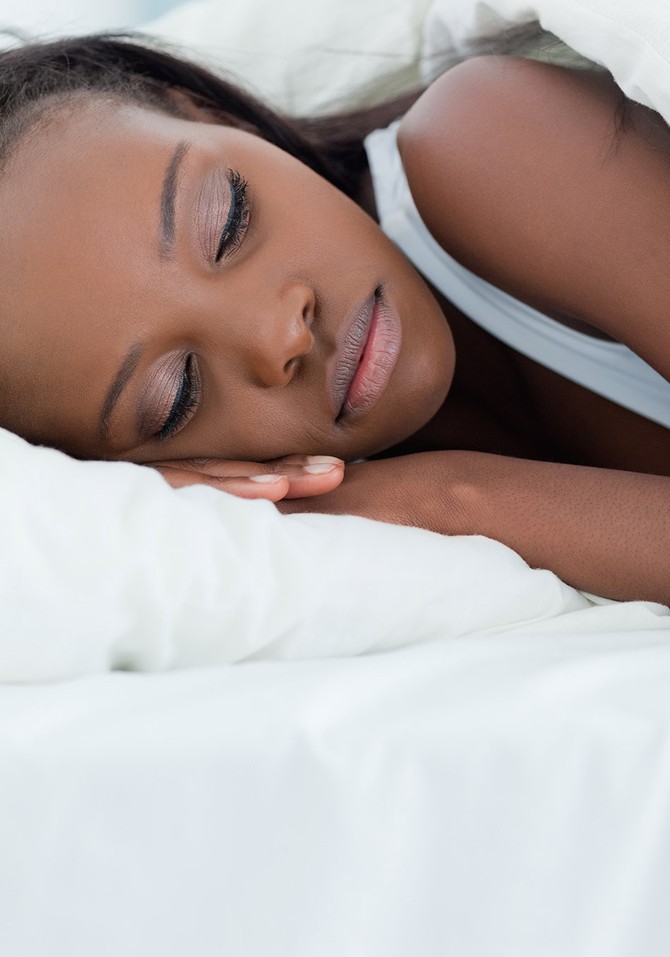What Your Sleep Style Says About You
How often and how much you sleep can offer surprising clues about your health and lifestyle.
By Corrie Pikul

Photo: George Doyle/Stockbyte/Thinkstock
You're in a happy relationship.
What you do: You and your partner fall asleep at the same time at night and wake up at around the same time each morning.
What this could mean: Researchers from the University of Pittsburgh tracked the sleep patterns of 46 couples over a 10-day period, and also asked each person to assess their relationship. Those couples who had similar sleep patterns with their spouses tended to be the most satisfied with their relationships, the scientists reported at the SLEEP 2014 conference in June. This makes sense: Early birds can have the mornings to themselves, while night owls can bond with each other while everyone else is asleep. But does it mean that couples who slumber together stay together? "There's data that being satisfied in the marriage might lead to a longer, happier marriage," says study author Heather Gunn, PhD. "What we found is that concordant sleep may be a part of that picture."
What this could mean: Researchers from the University of Pittsburgh tracked the sleep patterns of 46 couples over a 10-day period, and also asked each person to assess their relationship. Those couples who had similar sleep patterns with their spouses tended to be the most satisfied with their relationships, the scientists reported at the SLEEP 2014 conference in June. This makes sense: Early birds can have the mornings to themselves, while night owls can bond with each other while everyone else is asleep. But does it mean that couples who slumber together stay together? "There's data that being satisfied in the marriage might lead to a longer, happier marriage," says study author Heather Gunn, PhD. "What we found is that concordant sleep may be a part of that picture."

Photo: Wavebreakmedia Ltd/Thinkstock
You're at risk for back pain (if you don't have it already).
What you do: You sleep tummy-side-down.
What this could mean: Sleeping on your stomach, which is something 16 percent of us do, flattens the curve of the spine, which often leads to pain or stiffness the next day and back problems over time. It also forces you to twist your head to the side in order to breathe, putting stress on the neck, explains Nick Littlehales, a sleep coach based in the UK. Few people can maintain this position for the entire night, says Littlehales, leading to tossing and turning. It's worth learning a new way to doze off: Littlehales says that when you curl up on your non-dominant side (if you're a righty, that would be your left side), you not only take the pressure off your lower back, but you also put your body weight on the joints, muscles and tendons that are less used and therefore less sensitive. In other words, you make yourself comfy enough to stay put—and stay asleep—for most of the night. Front sleepers: Try propping pillows around your upper body to help you gradually turn to the side.
What this could mean: Sleeping on your stomach, which is something 16 percent of us do, flattens the curve of the spine, which often leads to pain or stiffness the next day and back problems over time. It also forces you to twist your head to the side in order to breathe, putting stress on the neck, explains Nick Littlehales, a sleep coach based in the UK. Few people can maintain this position for the entire night, says Littlehales, leading to tossing and turning. It's worth learning a new way to doze off: Littlehales says that when you curl up on your non-dominant side (if you're a righty, that would be your left side), you not only take the pressure off your lower back, but you also put your body weight on the joints, muscles and tendons that are less used and therefore less sensitive. In other words, you make yourself comfy enough to stay put—and stay asleep—for most of the night. Front sleepers: Try propping pillows around your upper body to help you gradually turn to the side.

Photo: Fuse/Thinkstock
You come alive at night.
What you do: You refuse to eat anything when you get up on weekday mornings.
What this could mean: Those with a delayed internal clock (or "chronotype") would prefer to go to sleep and wake up later than average, explains Till Roenneberg, a German chronobiologist and the author of Internal Time. This means that when you're forced to wake up just after dawn for work, family or other obligations, your body would rather be sleeping, not eating. Your internal clock influences all physiological processes, says Roenneberg, so not only do you feel lethargic and grumpy, but in addition, your digestive system isn't ready to handle food. Another clue that you're a late chronotype: You're probably famished midmorning, which by your clock is time to eat. You can figure out your chronotype by taking a survey like one developed by Roenneberg. He also suggests this exercise: Note your wake time on non-work days when you don't need to get up with an alarm clock. Compare it with the time you fell asleep on those days. Then, chart the midpoint, which is called your "midsleep." If your midsleep is 6 a.m., and your alarm clock is going off at 7 a.m., is it any wonder you're not in the mood for eggs?
What this could mean: Those with a delayed internal clock (or "chronotype") would prefer to go to sleep and wake up later than average, explains Till Roenneberg, a German chronobiologist and the author of Internal Time. This means that when you're forced to wake up just after dawn for work, family or other obligations, your body would rather be sleeping, not eating. Your internal clock influences all physiological processes, says Roenneberg, so not only do you feel lethargic and grumpy, but in addition, your digestive system isn't ready to handle food. Another clue that you're a late chronotype: You're probably famished midmorning, which by your clock is time to eat. You can figure out your chronotype by taking a survey like one developed by Roenneberg. He also suggests this exercise: Note your wake time on non-work days when you don't need to get up with an alarm clock. Compare it with the time you fell asleep on those days. Then, chart the midpoint, which is called your "midsleep." If your midsleep is 6 a.m., and your alarm clock is going off at 7 a.m., is it any wonder you're not in the mood for eggs?

Photo: TAGSTOCK1/iStock/Thinkstock
You're a snooze-aholic.
What you do: You almost always remember your dreams when you wake up.
What it could mean: We cycle through several cycles of sleep during the night, and the REM sleep phase is when we have our most bizarre dreams. Waking up during this period usually leaves people not only able to vividly recall their dreams but also feeling woozy, disoriented and unrefreshed, says Rafael Pelayo, MD, a sleep specialist at Stanford University. If we're jolted awake out of REM sleep by an alarm clock and then use the snooze button to fall back asleep for a short time, we may slip right back into the same dream. (See why experts say you really should wean yourself off this habit.)
What it could mean: We cycle through several cycles of sleep during the night, and the REM sleep phase is when we have our most bizarre dreams. Waking up during this period usually leaves people not only able to vividly recall their dreams but also feeling woozy, disoriented and unrefreshed, says Rafael Pelayo, MD, a sleep specialist at Stanford University. If we're jolted awake out of REM sleep by an alarm clock and then use the snooze button to fall back asleep for a short time, we may slip right back into the same dream. (See why experts say you really should wean yourself off this habit.)

Photo: Digital Vision/Photodisc/Thinkstock
You're flat-out sleep deprived.
What you do: You can fall asleep anywhere, at any time.
What it could mean: Assuming you've ruled out a disorder like narcolepsy, this tendency to nod off at the drop of a hat is probably a red flag that you need more sleep. One standard lab test is to put people in a dark, quiet room and measure how long it takes them to fall asleep, says Roenneberg. People who have had a restful night of sleep and who have woken up without an alarm clock don't usually doze off right away. It's usually those who aren't getting the sleep they need who have perfected the art of snatching zzz's whenever and wherever they can.
What it could mean: Assuming you've ruled out a disorder like narcolepsy, this tendency to nod off at the drop of a hat is probably a red flag that you need more sleep. One standard lab test is to put people in a dark, quiet room and measure how long it takes them to fall asleep, says Roenneberg. People who have had a restful night of sleep and who have woken up without an alarm clock don't usually doze off right away. It's usually those who aren't getting the sleep they need who have perfected the art of snatching zzz's whenever and wherever they can.
Published 08/11/2014

